Orchids and advanced chips: How Taiwan’s soft power is evolving
Sign up now: Get insights on Asia's fast-moving developments
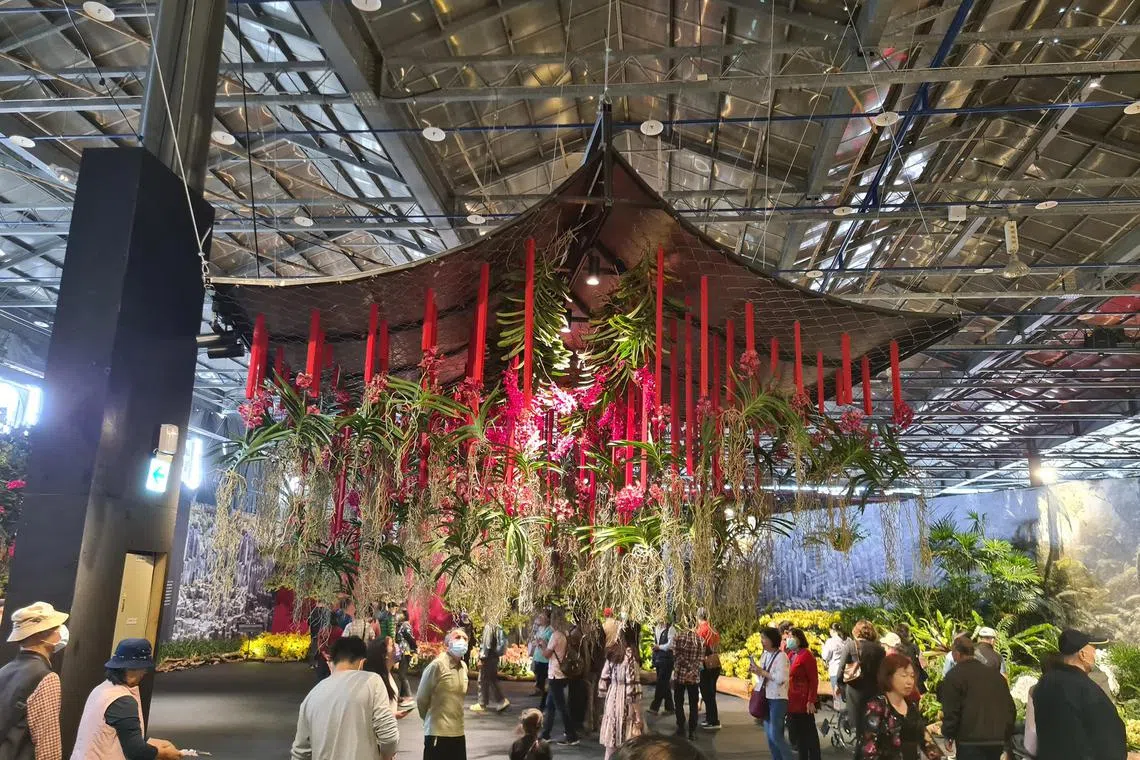
Among the showpieces at the 20th Taiwan International Orchid Show was a pavilion display modelled after a traditional Chinese roof structure.
ST PHOTO: ALBERT WAI
TAIPEI – There was a splash of colour in the exhibition hall, where visitors posed for photographs with blooms on display.
Among the showpieces at the 20th Taiwan International Orchid Show was a pavilion display modelled after a traditional Chinese roof structure – it was suspended from the ceiling and adorned with orchids and their aerial roots.
One exhibition hall at the event in Taiwan’s southern Tainan city showcased how orchids could be integrated into interior design, while international buyers met growers on the sidelines to explore deals.
While Taiwan might be better known for pineapples than orchids, it is one of the world’s top orchid exporters.
The delicate flower has emerged as one of the ways in which Taiwan is trying to assert itself internationally, away from the shadow of China, which claims the self-ruled island as part of its territory.
For a long time, Taipei’s soft power – generally defined as the use of economic and cultural influence to shape outcomes – was projected mainly through its Minnan culture, street food, pop songs and entertainment programmes.
As the island seeks to maintain its relevance amid shrinking diplomatic space, it has been evolving its soft-power strategy to include new areas such as agriculture and semiconductors, even as it doubles down on its cultural promotion efforts.
Mr Lin Hung-min, administrative affairs convenor of the orchid show in Tainan, said Taiwan’s orchid industry, which generates some US$200 million (S$268 million) a year, produces about 100 million orchid seedlings every year, of which 80 per cent are exported. Its main markets include the United States, Japan and Vietnam.
Popular orchid varieties from Taiwan that are exported include moth orchids with short, leafy stems and long-lasting flat flowers.
The orchid show attracts some 300,000 visitors annually, including 1,000 or so international buyers, said Mr Lin. In 2024, the two-week event from February to early March was held in tandem with the World Orchid Conference in Tainan.
Taiwan began developing its orchid industry about 40 years ago, and growers have come up with improvements, such as techniques to preserve the seedlings for export to faraway places like the US, said Mr Lin.
“Taiwan is famous for orchids. We want to attract more foreigners to come to Taiwan to buy these flowers,” he said.
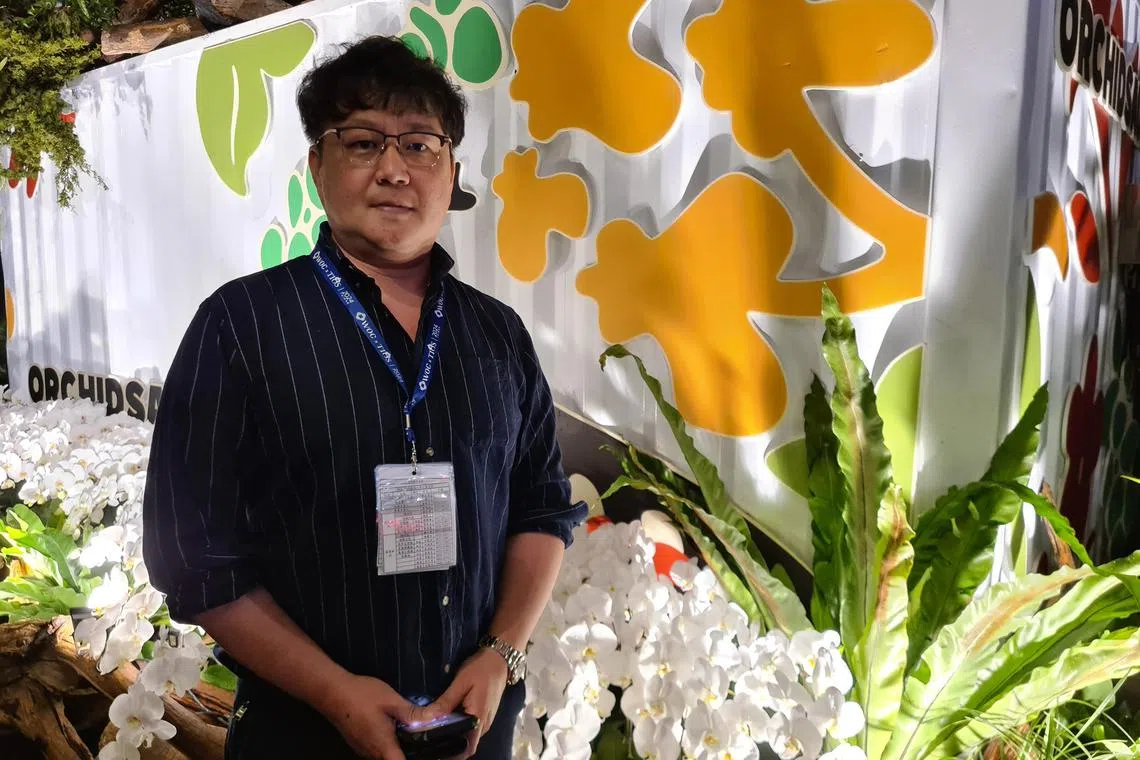
Mr Lin Hung-min, administrative affairs convenor of the orchid show in Tainan city, said Taiwan’s orchid industry generates some US$200 million (S$268 million) a year.
ST PHOTO: ALBERT WAI
Mr Ben Chou, 24, an undergraduate who served as a volunteer guide at the event, told The Straits Times: “We have a lot of floral artwork here. We showcase how orchids can be combined with our lifestyle. They are not just gifts. They can raise the quality of life.”
According to local media reports, President Tsai Ing-wen has thrown her weight behind Taiwan’s “orchid diplomacy”, which includes exchanges in horticultural techniques and hosting orchid shows overseas.
As tensions with China grow, Taipei has rolled out what it calls a “New Southbound Policy” to strengthen ties with South-east Asia.
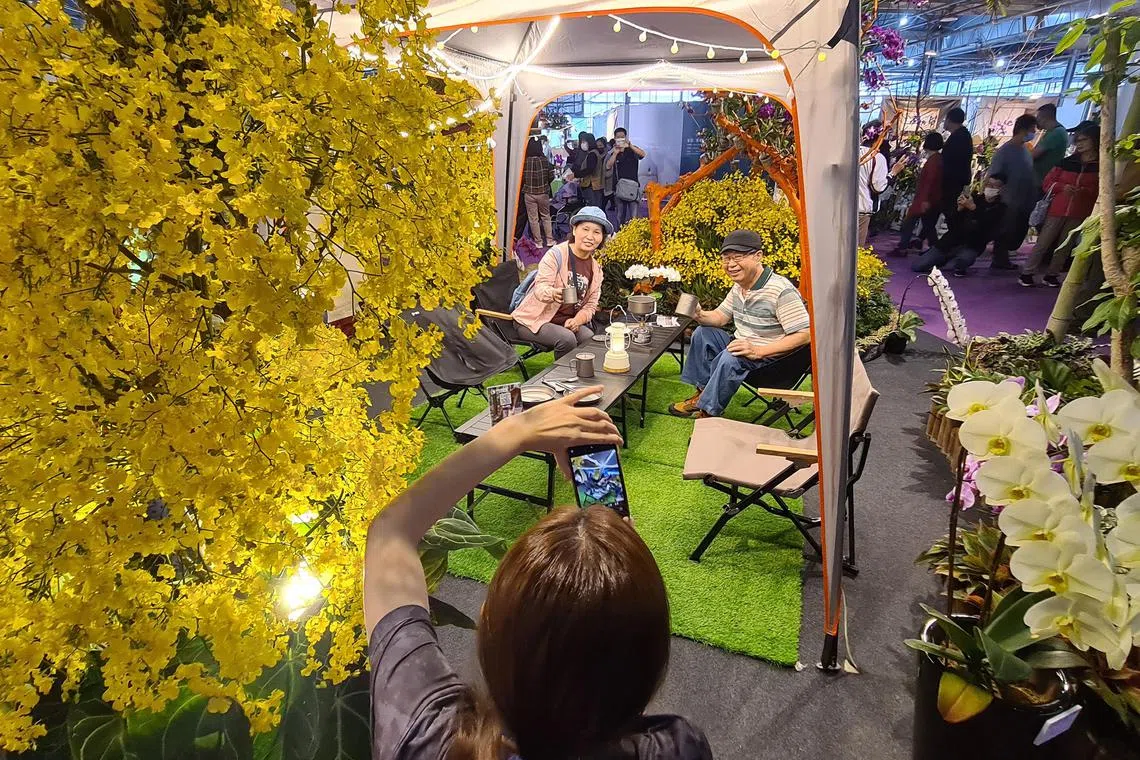
Visitors at the 20th Taiwan International Orchid Show from February to early March. Part of the exhibition showcased how orchids could be integrated into interior design.
ST PHOTO: ALBERT WAI
The push to increase agricultural exports falls under the southbound policy, Ms Grace Lin, director-general of international affairs at Taiwan’s Agriculture Ministry, told a group of international journalists in February.
She explained that owing to geographical proximity and language similarities, Taiwan has traditionally viewed the mainland as its main market for agricultural exports. But with China banning several agricultural products from Taiwan for political reasons, there is a need to diversify Taiwan’s markets.
“We don’t want to put all our eggs in one basket,” said Ms Lin.
Tech prowess
Another important pillar of Taiwan’s soft-power strategy is the strength of its semiconductor industry.
The island produces about 60 per cent of the world’s semiconductors; for advanced chips, it accounts for more than 90 per cent of the global market.
“We play a very crucial role in the global supply chain. Our companies have the cutting edge,” said Ms Catherine Hsu, director-general of international information services at Taiwan’s Foreign Ministry.
She said that during the Covid-19 pandemic, Taipei received requests from its international partners to push major chipmaker Taiwan Semiconductor Manufacturing Company, or TSMC, to ramp up production of its chips used in vehicles, to ensure that the German automotive industry would not be disrupted.
“If there is a conflict in this area, not only semiconductors but other global supply chains will be affected,” she said.
Macronix International, a non-volatile memory chip supplier based in Hsinchu Science Park, which is also known as Taiwan’s Silicon Valley, is among the top Taiwanese companies in the semiconductor sector. It supplies parts for a wide variety of products, including Nintendo Switch game consoles and electric vehicles.
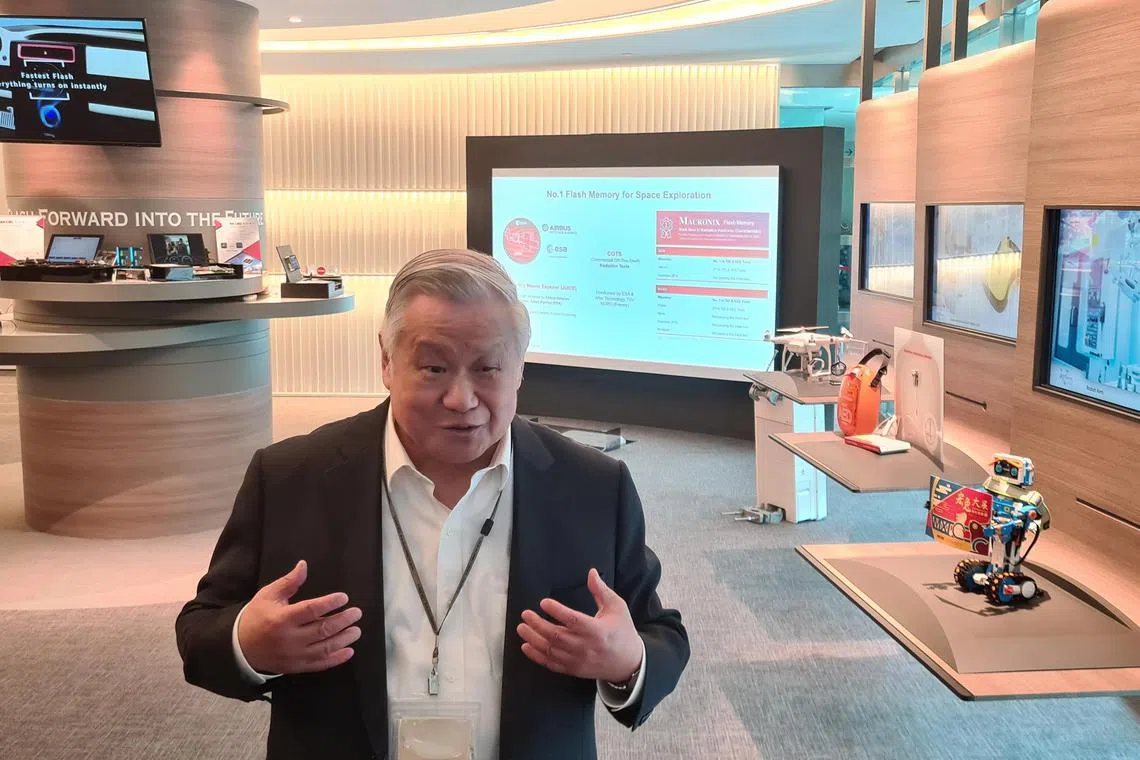
Mr Miin Wu, chairman and CEO of Macronix International, says Taiwan’s soft power is actually in its methodology.
ST PHOTO: ALBERT WAI
When asked to comment on the role of technology in Taiwan’s soft power, Mr Miin Wu, Macronix’s chairman and chief executive, said: “The key to Taiwan’s soft power is actually in terms of our methodology. If you have the right methodology, then you can create the solution.
“This is what makes Taiwan’s soft power so great.”
Amid geopolitical tensions, Taiwanese semiconductor companies should turn challenges into opportunities, said Ms Chen Shu-chu, deputy director-general of the Hsinchu Science Park Bureau.
She said this includes investing in new consumer markets and expanding globally. “I believe our companies will take this opportunity to invest abroad,” she said.
Culture remains key
Even as Taiwan is fine-tuning its soft-power strategy, cultural promotion efforts are likely to remain important. But given the cultural similarities with the mainland, how can Taiwan stand out?
Ms Stella Yu, deputy secretary-general of the General Association of Chinese Culture (GACC), acknowledged that there may be confusion internationally between Chinese and Taiwanese culture.
She pointed out that Chinese culture is a part of Taiwanese culture. Besides cultural influences from the Minnan and Hakka dialect groups, Taiwan’s culture is also influenced by the aboriginal and new immigrant segments of the population.
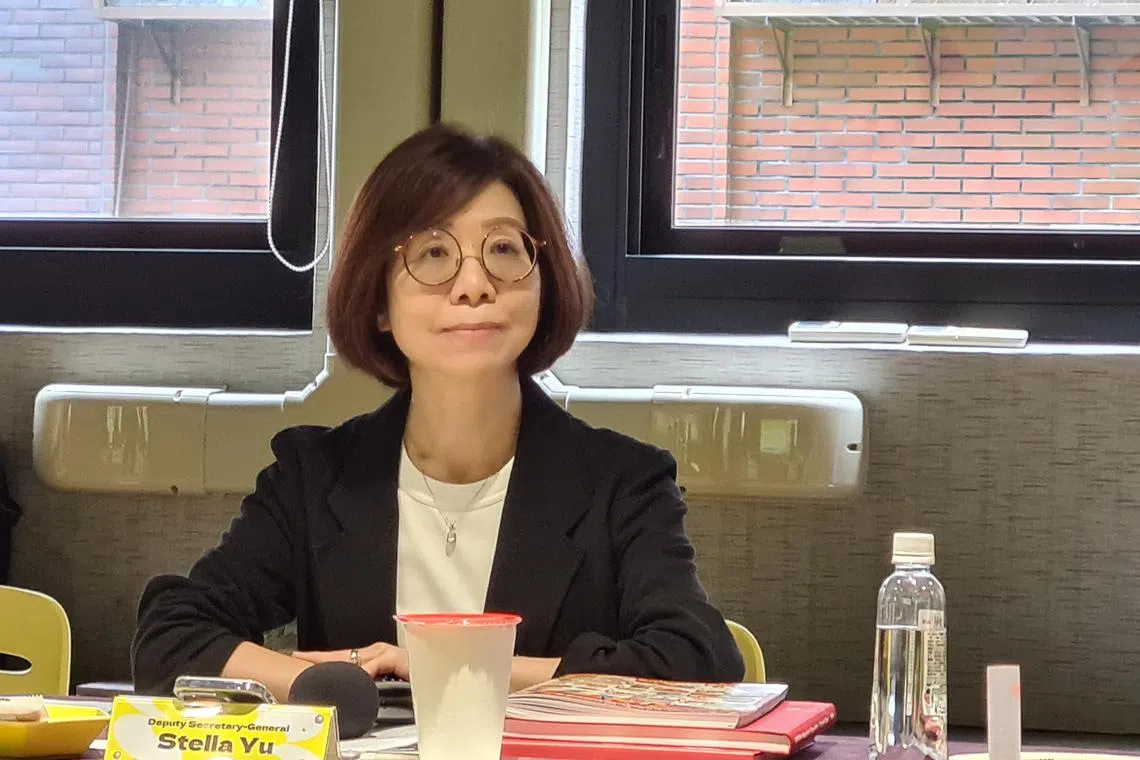
Ms Stella Yu, deputy secretary-general of the General Association of Chinese Culture, acknowledged that there may be confusion internationally between Chinese and Taiwanese culture.
ST PHOTO: ALBERT WAI
“Taiwan does not have enough international exposure. And this is what GACC is working towards,” Ms Yu said.
A non-governmental organisation for cultural outreach, the GACC is typically chaired by the Taiwanese president. Over the last few years, it has organised various activities, including sleepovers for influencers at the presidential palace, and the Matsu Biennial art event held on the Matsu Islands.

Visitors photographing the blooms on display in an exhibition hall at the 20th Taiwan International Orchid Show in Tainan city.
ST PHOTO: ALBERT WAI
Ms Chih Yi-yeh, supervisor of GACC’s media and communication department, said: “The uniqueness about Taiwan is that we safeguard democracy and embrace inclusivity. This is not an easy job, especially in the face of pressure from China.”
Taipei has on many occasions highlighted its efforts in strengthening democratic systems and respect for human rights, as a reminder that it is different from Beijing.
Giving her assessment of Taiwan’s soft-power efforts, Ms Adrienne Wu, a research associate at the Washington-based Global Taiwan Institute, said China’s heavy-handed actions mean there are areas of opportunity for Taiwan.
For instance, when China banned Taiwanese pineapple exports in March 2021, it created opportunities for Taiwan to forge closer ties with other partners such as Japan, which stepped in to buy the fruit.
However, Ms Wu cautioned that there should also be consistency between Taiwan’s soft-power messaging and what people see when they are in Taiwan.
She said that it was best to “try to promote things that are already inherent to their domestic society and formed through grassroots initiatives. If they do this, then it will be consistent with people’s experiences of Taiwan as well as Taiwanese people’s view” of the island’s image.
Associate Professor Chong Ja Ian of the National University of Singapore (NUS) noted that Taiwan has made significant strides in stressing a commonality of political values that centre on democracy and human rights, as well as its importance in global supply chains.
“It would probably do well to consolidate and expand upon its advantages,” said Prof Chong, who is with NUS’ political science department.
Looking ahead, he said Taiwan will need to ensure that it maintains its distinctiveness in the minds of others.
“In the long run, whether Taiwan succeeds depends on its ability to maintain its own system and show the world that this is of value.”



